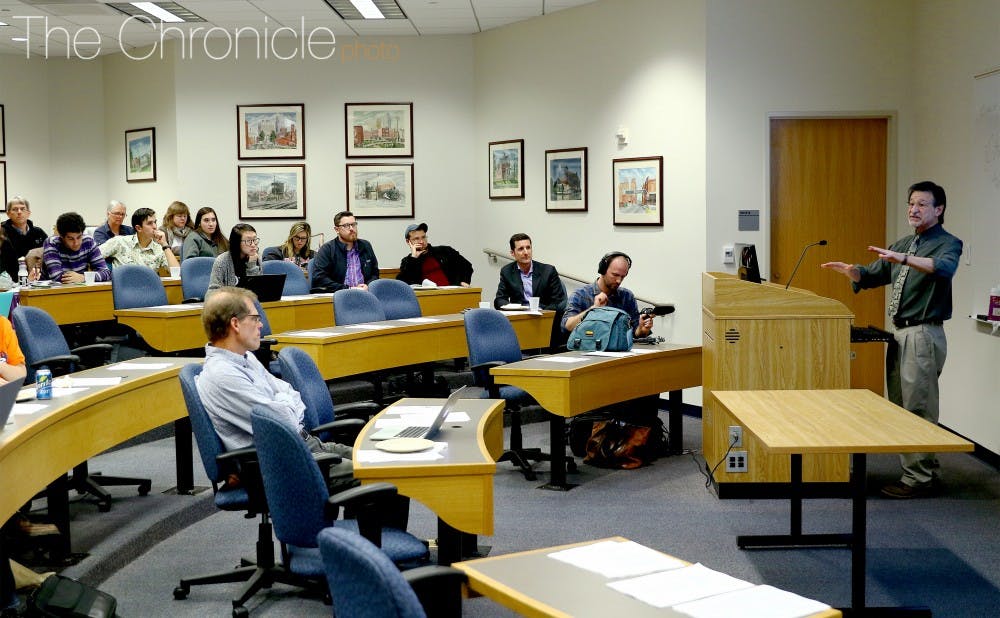A teach-in Tuesday evening highlighted the difficulties Duke students will have voting in 2016.
Sponsored by Scholars for North Carolina’s Future, the history department and several student organizations, the event at the Divinity School centered around the history of voter suppression in North Carolina and discussed how Duke factors into North Carolina’s electoral landscape. After the presentation, participants developed strategies to help students make it to the polls next year.
“[In 2008], North Carolina had the largest youth turnout in the Union,” said Gunther Peck, associate professor of public policy and history. He explained that in 2008, Obama won the state by about 14,000 votes. Duke’s early vote site had nearly 10,000 voters that year.
Much of the teach-in was devoted to explaining Duke’s voting history. Peck noted that when there was an early voting location on Duke’s campus during the 2008 general election, 87 percent of registered students voted—including 93 percent of registered voters in the Class of 2012. He said the large wave of youth participation that propelled Obama to victory in N.C. in 2008 resulted in the passage of a new voting law in 2013 that made it more difficult for young people and minorities to vote.
The event also focused on a number of changes to voting procedures that will affect Duke students. Until recently, students have been able to register to vote on the day of the election using their student ID. In 2016, that will no longer be an option. Everyone who plans on voting must register at least 25 days before the election and obtain a government-issued ID.
Fred McBride, senior policy analyst at the Southern Coalition for Social Justice, urged students to use their passports or, if they have them, North Carolina driver’s licenses. There are also provisions that account for those who are unable to obtain an ID, he noted. Students who are able to demonstrate a reasonable impediment to getting an ID—such as an inability to take off time from work or a disability—may vote with a provisional ballot and an alternate method of identification.
Freshman Eyram Klu said he came to the teach-in to learn about the reasoning behind the new voting laws.
“I decided to get registered to vote for the purpose of participating in the electorate and being an active citizen in the United States, so I want to hear about why my voting rights are being repressed,” Klu said.
Duke Student Government, along with Duke’s student-run political organizations, have been working to mitigate some of the issues the new voting legislation has created, said freshman Jackson Dellinger, senator for Durham and regional affairs.
He explained that DSG is meeting with Michael Schoenfeld, vice president for public affairs and government relations, to try and secure an early voting site on campus for 2016. The Durham and regional affairs committee is also working to register students for the upcoming November election, including reaching out to East Campus house councils to get freshmen registered and tabling on West Campus to register upperclassmen.
In the long term, the committee is trying to institutionalize the process so that freshmen will be registered within the first few weeks they are on campus. The committee also wants to establish a system to re-register upperclassmen when they move to West or Central Campus, which are in a different precinct from East.
Within the next few weeks, the teach-in’s organizers plan on circulating a letter to key student organizations urging the Durham County Board of Elections and Duke administrators to support a voting site on campus. They also want to commence a widespread education campaign outlining the changes in voting procedures. Representatives from DSG and the Graduate and Professional Student Council want to pass a resolution that supports the voting site and suggests possible locations, including the Rubenstein Library or the renovated West Union building.
“We want to make students know they need to work hard to protect their rights in this political climate,” said John Steen, program coordinator for Scholars for North Carolina’s Future.
Get The Chronicle straight to your inbox
Signup for our weekly newsletter. Cancel at any time.
Class of 2019
Editor-in-chief 2017-18,
Local and national news department head 2016-17
Born in Hyderabad, India, Likhitha Butchireddygari moved to Baltimore at a young age. She is pursuing a Program II major entitled "Digital Democracy and Data" about the future of the American democracy.

